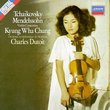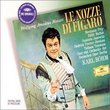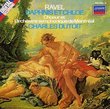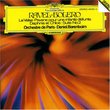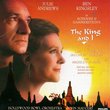| All Artists: Dennis Russell Davies Title: Joseph Haydn: The Complete Symphonies Members Wishing: 0 Total Copies: 0 Label: Sony Classics Original Release Date: 12/15/2009 Release Date: 12/15/2009 Genre: Classical Style: Symphonies Number of Discs: 37 SwapaCD Credits: 37 UPC: 886974433125 |
Search - Dennis Russell Davies :: Joseph Haydn: The Complete Symphonies
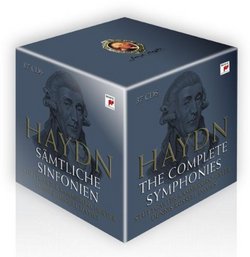 | Dennis Russell Davies Joseph Haydn: The Complete Symphonies Genre: Classical
37 CD box set. Sony. 2009. |
Larger Image |
CD DetailsSynopsis
Album Description 37 CD box set. Sony. 2009. Similarly Requested CDs
|
CD ReviewsGood Playing + Poor Engineering + Poor Scholarship = Skip It R. Lane | Tracy, CA USA | 01/09/2010 (2 out of 5 stars) "About the only good attribute one can fix to this set is the fine playing of the exemplary Stuttgart Chamber Orchestra. Indeed, the execution throughout is first class. And there are times when the fine ensemble musicianship shines so bright that the other shortcomings are hardly noticeable. But those moments are not very common, which says a lot about the sloppy nature of much the other elements that go into producing a musical experience. Dennis Russell Davies shows no consistency with regards to repeats, or other elements of interpretation. Some repeats he follows, some he does not. Sometimes he appears to be meticulous about following the composer's instructions, while at other times he appears to disregard them entirely. The choice to use a harpsichord continuo throughtout the set is a sign that the series was clearly done by "flying by the seat of your pants" with very little thought or planning. I was mostly very disappointed with the tempo choices in some of Haydn's most profound slow movements, such as the conclusion of the "Hornsignal" #31, and the second movement (Andante) from Sym. #83. One of the best uses I have in mind for such moments is to play those for a person who finds Brahms German Requiem to be an intolerable dirge. Perhaps after hearing some of the pathetic moments in these examples, and others from this set, those persons will see the Brahms as an absolute celebration of joy (which it is anyway, though few see that in it). But by far the worst part about this set is the engineering. All are live recordings with unnecessary audience applause at the end of every symphony. Many of the symphonies have the channels switched (i.e., violins inappropriately on the right, etc.). And there are a few that have editting mistakes that result in a "pause" of 5-10 seconds that is clearly NOT part any one actual performance but the result of poor splicing together of performances recorded over a number of different concerts. Overall, this set was quite clearly just "thrown together" so that Sony could have something to offer the market for the Haydn celebration in 2009. Don't waste your money. If you want a complete set, either of the other three available sets make a far better choice (Naxos with a variety of orchestras/conductors, Dorati on Decca, or Fischer on Brilliant Classics). Dorati - Complete Symphonies (Box) Naxos - F.J. Haydn: The Complete Symphonies (Box Set) Fischer - Haydn: Complete Symphonies (33 CD Box Set) The Fischer is probably the most comprable cost-wise, as the Dorati appears to already have sold-out in its latest packaging. And the Fischer, despite its flaws, is far superior to this Sony set. Sony - consider this your Edsel and learn from it." Still the Gold Standard John Van Note | 10/14/2009 (5 out of 5 stars) "With this review, I am taking the liberty of critiquing releases of three complete performances of the Haydn Symphonies: To undertake a completely recorded set of Haydn's Complete Symphonies is a monumental and ambitious project. To complete it is a monumental accomplishment of having recorded a considerable body of work written by the "father of the symphony," which in itself must provide great relief and satisfaction to all involved upon its completion. Dennis Russell Davies has but three predecessors here: First, the forerunning, pioneer analog set with Antal Dorati conducting the Philharmonia Hungarica and then Adam Fischer digitally recorded the set with the Austro Hungarian Haydn Orchestra in the late 1980s through the early 1990s, first on the Nimbus label, then it was released as a set of its own on Brilliant Classics, then repackaged earlier this year as part of the commemorative Brilliant Classics Haydn Edition (which in spite of its sprawling 150 CDS is not yet "Complete."). And there is a Naxos set which has been released in its separate parts for some time, but has found a recent reissue in a complete boxed set for 2009 for about one hundred dollars, which is not reviewed here. The Dorati set, which after all of these years, I still regard as the gold standard for these performances, is now recently released in its latest budget priced form commemorating the bicentennial of Haydn's death. The orchestra concerned, the Philharmonia Hungarica, was composed of émigrés from the abortive and Soviet suppressed 1956 Hungarian revolt. It is now available in its current version as a cardboard sleeved box of thirty three disks, now acquirable for literally a song, a little more than for sixty dollars. The set has had transformations in several incarnations itself: On London Records originally, when these were originally released on forty eight phonograph records in the mid 1970s. These were released in the late 1980s in a set of thirty two compact disks at high mid price in jewel boxed subsets of four to a jewel box. I bought this set in this first CD incarnation at a cost of some ten dollars per disk. Another release in the 1990s took it out of its jewel cases and put it in paper sleeves, which by no means detracted from the recordings and lowered their cost into the lower two hundred dollar range. In its current version, it is indispensable for any serious collector of Haydn's music. This set is only the beginning. And if one is to be the proud owner of only one cycle of Haydn's One Hundred Four, plus three. This is the one set to get if you can afford only one. The Sony Dennis Russell Davies set, priced at seventy five dollars, recorded in the Daimler Benz concert hall in Stuttgart, arrived from Amazon in an "environmentally correct" box and packaging, no plastic jewel boxes, cardboard sleeves, divided into a half dozen color coded groups or subsets within the set: The Early Symphonies, The First Symphonies Written for Prince Esterhazy, The Storm and Stress Works, Symphonies for Entertainment Purposes, Symphonies for the Public at Large (which includes the "Paris" Symphonies and those after it before the "London" set), and the London Symphonies. The set of what is now, the complete one hundred four, plus Sinfonia Concertante and Symphonies "A" and "B" (on the Dorati and Fischer sets) added as "Symphonies 105, 107, and 108, is a compilation of live recordings spanning some twelve years of recording of live performances on thirty seven compact disks, four disks more than both of Dennis Russell Davies`s predecessors, Antal Dorati and Adam Fischer. The applause from the live performances has been added to and included with all of the symphonies, and this might account for the necessity of the spreading out the project onto four additional compact disks. Arguably, it might be well worth it, but I find the interruptive applause intrusive. The program booklet lists the one hundred four in Dennis Russell Davies's/Sony's recorded order, but timings of the individual symphony movements are missing in the booklet, and rather, we have the total recording time for each of the symphonies on the cardboard sleeve. Unlike Dennis Russell Davies's earlier predecessors, who boxed their recordings in sequence according to the Eusebius Mandyczewski`s-Anthony von Hoboken's compilation 1-104, these are presented to the purchaser in order of completion rather than by order of publication, which appears on the first superficial glance to be arranged in little order at all: For example, Disk One places No. 1 with 37, 18, and 2 in that order. Disk Two has No. 4, 27, 10, and 20. Further on down, it's Nos. 15, 3, 6, and 7. The notes in the Sony-Dennis Russell Davies set give their detailed explanation for this. To listen to the symphonies in this order changes the experience to one which is new and to one with which one is unaccustomed, even for a familiar listener, for better or worse. It is my understanding that the Naxos set has not released the symphonies in their numbered order as well. Technically, the Dennis Russell Davies performances are sonically flawless without a glitch, and they are taken at tempi somewhere sanely halfway in between the Dorati to which I have long since grown accustomed, and the raced renditions of some of the Fischer as is the case in Haydn's slow movements such as in the opening No. 22, or in the No. 26 Adagio. So I would give the Sony/Dennis Russell Davies and Stuttgart the five stars here. There is a lengthy section within the program booklet which gives individual credit to the individual performers in the ensemble, and the orchestral sound is not overpowering, more chamber like, which inclines me to thing that these are period instrument performances. Unless one objects to that, and would rather be acoustically overwhelmed and overpowered by a Bernstein or a von Karajan, I would recommend the purchase. In all fairness, the Dorati "London" group of symphonies seems to have grown leanly orchestrated in its own right over time. A plus for the Fischer recordings is the intimacy and presence of the virtuosi, the solo instrumentalists of No. 6 ("Morning"), No. 7 ("Noon"), and No. 8 ("Evening"). If one is allowed to have but one set of Haydn, I would stick with Dorati's renditions, as it is and has been the gold standard by which I have judged the others as well as the newcomers. If you possibly can do it, for a little over two hundred dollars you can have all three cycles. I would strongly urge their acquisition for any Haydn fan. Dennis Russell Davies' set is arguably in a dead heat with or even surpasses what are some of Fischer's raced tempi and accelerated accounts for a second place finish, which is not so bad of a consolation for there being only three complete recordings of the essential acquisition for any serious classical music collector. " Very nice indeed! Michael Capizzi | Illinois, USA | 05/23/2010 (4 out of 5 stars) "Haydn is unique in the field of music. A seminal figure who was present at the birth of several genres of classical music, e.g., symphonies, string quartets, piano sonatas. And while he did not actually create any of these genres, he played such a central role in their development that he is rightfully considered the "father" of at least two of them, i.e., the symphony and the string quartet. A combination of musical genius and life circumstances (he served as the musical director for Prince Esternazy for thirty years at the prince's castle) led to an unrivaled output of musical compositions. Here we deal with his 107 symphonies. And while iit is true that Mozart and, more importantly, Beethoven carried his genius to greater heights and more dramatic output, I do not believe that their work would stand today as it does without Haydn's great influence.
There are any number of great recordings of Haydn's later symphonies; and anyone interested in only his masterpieces is better directed to any of them: Colin Davis, thomas Beecham, Leonard Bernstein, Otto Klemperer, in no particular order. But anyone contemplating the purchase of his entire symphonic output is looking beyond just masterpieces. He or she is looking for continuity and development of a genre from "birth" to masterpiece. And Haydn's 107 symphonies does just that. For years the standardbearer has been Dorati's fantastic cycle with the Philharmonia Hungarica. But in a relatively short period of time, we have gained several new cycles: Fischer with his Austrio-Hungarian forces, Naxos's cycle with various chamber orchestras (all based in Europe except for the Toronto Chamber Orchestra) and conductors, and now this current offering by Russell Davies and the Stuttgart Chamber Orchestra. I have all of the complete sets except for Fischer's and all of the incomplete sets mentioned above as well as many other individual recordings. There is not one that has disappointed me, and, depending on my mood, I can turn to the interpretation I want at that moment to provide enjoyment. And and that is exactly what each symphnoy provides, no matter the conductor or orchestra. I must admit that I am attracted to the Russell Davies cycle because I prefer the smaller sound of the chamber orchestra. I generated considerable discussion when I blasted Leonard Bernstein's interpretation of the Paris and London symphonies. For those who like it, and at times, I love it, it is there. But most often I turn to the Naxos cycle (available individually) and now this new one. Even onmodern instruments, I sense that they offer a sound closer to that heard by Haydn when he composed them. I have had the Russell Davies set only a short while, and have only "hopped about",, trying syphonies in no particular order. What I have heard is Haydn of the highest order, done with grace and intelligence. Recorded before live audiences, the discs offer both sponteneity energy that come only when a paying audience is listening. Be forewarned: this is not a perfect set. While all previous statements pertain across theboard, I do find some of the later symphonies to be off the mark in opening measures in some ofthe movements, i.e., sometimes agonizingly slow or overly dramatic. But compared to the inummerable pleasures offred throughout, this is nothing. And I have yet to find one instance of the orchestra failing to play its music less than exceptionally well. At $60.00 (including shipping) on the Amazon Marketplace, this is an incredible bargain. I can only hope that people buy it before SONY discovers what it has on its hands. Highly recommended.i" |

 Track Listings (5) - Disc #1
Track Listings (5) - Disc #1
